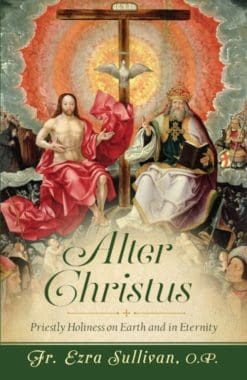After prayer and the administration of the sacraments, preaching is the most important work that a priest is called to do.
Preaching may be understood as a prophetic task, in which the priest stands in place of Christ and mediates the truths of God to the people to whom he is sent: here, by preaching, I include both teaching and non-liturgical exhortation. Like Noah, every preacher is to be “a herald of righteousness” (2 Pet. 2:5): to herald that we are all called to righteousness, showing how to become righteousness, and revealing that the essence of righteousness is union with the Most Blessed Trinity. The preacher therefore imitates God’s own action, for God reveals Himself as righteousness. As noted, God the Father “preaches” God the Son eternally. St. John of the Cross eloquently said of God the Father, “In giving us his Son, his only Word (for he possesses no other), he spoke everything to us at once in this sole Word—and he has no more to say.” Christ’s mission in the world was to extend this “preaching” of the Father into time and space, so that the Word of truth might abide in the hearts of believers. Bl. Conchita explains:
The Incarnate Word is the Word that speaks because it is the Father’s voice, creating and sanctifying through the Holy Spirit who communicated it to the apostles at Pentecost. . . . Man’s word passes on and dies; God’s Word accomplishes its work and lives, and returns triumphant to where it came from because it is the saving Word, the Word of light and fire; the unique Word that encompasses all that is created and everything that exists, because this Word is God.
Conchita, Priests of Christ
This is the profound interpretation of Christ’s word to His disciples, “Let us go on to the next towns, that I may preach there also; for this purpose have I come” (Mark 1:38*). Likewise, “I must preach the good news of the kingdom of God . . . for I was sent for this purpose” (Luke 4:43).
The Gospels record preaching as one of Christ’s most frequent and prominent public activities. At the beginning of His public life, Jesus went to a synagogue and said to His townsfolk in Nazareth, “The Spirit of the Lord is upon me, because he has anointed me to preach good news to the poor,” showing that His act of preaching was blessed by the spirit of charity for God and neighbor (Luke 4:18). The Gospels couple Christ’s teaching and preaching, since they are intimately united activities. St. Matthew tells us that Jesus “went about all Galilee, teaching in their synagogues and preaching the gospel of the kingdom” (Matt. 4:23). But His preaching was not limited to His home territory: He preached throughout Judea, and He even preached to the non-Jewish in Samaria (John 4:1–6).
Christ extended His preaching mission to His apostles: He commanded them, “Go rather to the lost sheep of the house of Israel. And preach as you go, saying, ‘The kingdom of heaven is at hand’ ” (Matt. 10:6–7). Like Christ, their preaching and teaching was anointed by the Spirit of God: “The Counselor, the Holy Spirit, whom the Father will send in my name, he will teach you all things, and bring to your remembrance all that I have said to you” (John 14:26). Christ prophesied that, through His apostles, “this gospel of the kingdom will be preached throughout the whole world, as a testimony to all nations; and then the end will come” (Matt. 24:14); and, after His Resurrection, He sent them out for that purpose: “All authority in heaven and on earth has been given to me. Go therefore and make disciples of all nations, baptizing them in the name of the Father and of the Son and of the Holy Spirit, teaching them to observe all that I have commanded you” (Matt. 28:18–20). Thus we can see that, “preaching the Gospel is simply a continuation of the divine mission of Christ.”
The Church therefore has always understood the mission of preaching and teaching the Gospel to be a prerogative of the apostles and their successors, first of the bishops and next of those whom the bishops appoint. So highly was the office of preacher regarded that, up to the Middle Ages, a cleric had to receive special faculties to preach, lest he lead the people of God astray. In response to a 2008 Synod of Bishops on the Word of God, Benedict XVI commanded that a Homiletic Directory be prepared; in 2015, it was published by the Congregation for Divine Worship. Near the beginning, it repeats the perennial understanding of the Church regarding liturgical preaching: “Because the homily is an integral part of the Church’s worship . . . it is to be delivered only by bishops, priests, or deacons.
We can see, then, the importance in light of the fact that it is a participation in the eternal action of the Holy Trinity, and more specifically an extension of the missions of the Son of God and the Holy Spirit among men. While other works might have some temporal good in mind, such as helping alleviate hunger, or healing a wounded body, preaching feeds the soul hungry for the Word of truth, and it helps heal spiritual wounds. Whereas other kinds of teaching bring forth truths knowable by the unaided human intellect, preaching relies on the wisdom of God Himself to scatter the seed of supernatural revelation.
Considered as a gift given to mankind, preaching is an important and even necessary means, because only through the communication of a word can the intellect know what is true. Angels communicate knowledge by illuminating each other without spoken words, for, as spirits, they are without ears and lips. For humans, however, the ordinary and proper way to receive knowledge is by hearing. Indeed, St. Paul affirms: “Faith comes from what is heard, and what is heard comes by the preaching of Christ” (Rom. 10:17). Undoubtedly, God infused faith into the heart of the believer; but God’s action coincides with the person’s first hearing the Gospel, and then his choice to believe what he has heard. Accordingly, the apostle asks rhetorically: “How are men to call upon him in whom they have not believed? And how are they to believe in him of whom they have never heard? And how are they to hear without a preacher?” (Rom. 10:14).
The traditional Catholic understanding of this truth has been expressed in many ways. Bl. Humbert of Romans, in his Treatise on Preaching, put it this way: “Just as preaching gains entry for souls into heaven more quickly and more surely, so too it prevents their fall into hell. . . . Without preaching, which scatters the word of God like seed, the world would be sterile and produce no fruit.” Bl. Humbert even states, “Preaching is also indispensable to the infidels; for without it they could not arrive at faith, a necessary condition for salvation.” St. Thomas Aquinas explains that the human efficient cause of faith is the preacher: “One cannot believe, unless he hears the word of the preacher,” but the interior formal cause is God, Who attracts a person’s heart to accept the Gospel as good for himself. In the words of St. Alphonsus Liguori: “Jesus Christ has declared that to save men his Passion alone was not sufficient, but that preaching was also necessary in order that men might do penance for their sins and amend their lives.” Jesus proved this truth to His disciples after His Resurrection: “Thus it is written, that the Christ should suffer and on the third day rise from the dead, and that repentance and forgiveness of sins should be preached in his name to all nations” (Luke 24:46–47).
+
This article is adapted from a chapter in Alter Christus by Fr. Ezra Sullivan which is available from Sophia Institute Press.
Art for this post: Cover and featured image used with permission.





